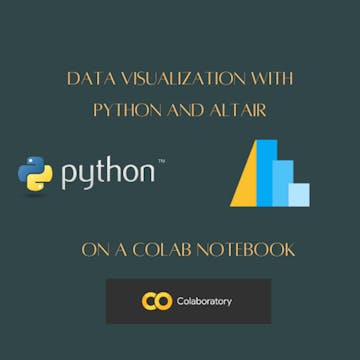
Good to know
Save this course
Reviews summary
Visualizing with altair: mixed bag
Activities
Review Python syntax
Show steps
Brush up on the fundamentals of Python syntax to ensure a solid foundation for this course.
Browse courses on
Python Syntax
Show steps
-
Go through online tutorials on Python syntax.
-
Practice writing simple Python code snippets.
Review 'Effective Data Visualization' by Stephanie Evergreen
Show steps
Gain insights into best practices and principles of data visualization to enhance your Altair usage.
View
Effective Data Visualization
on Amazon
Show steps
-
Read through the book, focusing on chapters relevant to Altair and data visualization.
-
Summarize key concepts and techniques in your own words.
Follow Altair tutorials
Show steps
Enhance your understanding of Altair's features and capabilities through guided tutorials.
Show steps
-
Explore the official Altair documentation and tutorials.
-
Complete interactive exercises and examples provided in the tutorials.
-
Experiment with different Altair chart types and options.
Three other activities
Expand to see all activities and additional details
Show all six activities
Collaborate on Altair projects
Show steps
Engage with peers to exchange knowledge, troubleshoot challenges, and enhance your understanding of Altair.
Show steps
-
Join or create a study group or online forum for Altair users.
-
Share your Altair code and visualizations with others for feedback and suggestions.
-
Collaborate on data visualization projects with peers.
Create various Altair visualizations
Show steps
Solidify your Altair skills by creating a variety of visualizations with different datasets and chart types.
Show steps
-
Gather or generate datasets suitable for visualization.
-
Design and create visualizations using Altair, exploring different chart types and options.
-
Analyze and interpret the results of your visualizations.
Build an interactive Altair dashboard
Show steps
Apply your Altair skills to create a visually appealing and informative dashboard that showcases your data analysis and visualization abilities.
Show steps
-
Identify a dataset and define the scope of your dashboard.
-
Design and implement the dashboard using Altair, incorporating multiple visualizations.
-
Host the dashboard online and share it with others.
Review Python syntax
Show steps
Brush up on the fundamentals of Python syntax to ensure a solid foundation for this course.
Browse courses on
Python Syntax
Show steps
- Go through online tutorials on Python syntax.
- Practice writing simple Python code snippets.
Review 'Effective Data Visualization' by Stephanie Evergreen
Show steps
Gain insights into best practices and principles of data visualization to enhance your Altair usage.
View
Effective Data Visualization
on Amazon
Show steps
- Read through the book, focusing on chapters relevant to Altair and data visualization.
- Summarize key concepts and techniques in your own words.
Follow Altair tutorials
Show steps
Enhance your understanding of Altair's features and capabilities through guided tutorials.
Show steps
- Explore the official Altair documentation and tutorials.
- Complete interactive exercises and examples provided in the tutorials.
- Experiment with different Altair chart types and options.
Collaborate on Altair projects
Show steps
Engage with peers to exchange knowledge, troubleshoot challenges, and enhance your understanding of Altair.
Show steps
- Join or create a study group or online forum for Altair users.
- Share your Altair code and visualizations with others for feedback and suggestions.
- Collaborate on data visualization projects with peers.
Create various Altair visualizations
Show steps
Solidify your Altair skills by creating a variety of visualizations with different datasets and chart types.
Show steps
- Gather or generate datasets suitable for visualization.
- Design and create visualizations using Altair, exploring different chart types and options.
- Analyze and interpret the results of your visualizations.
Build an interactive Altair dashboard
Show steps
Apply your Altair skills to create a visually appealing and informative dashboard that showcases your data analysis and visualization abilities.
Show steps
- Identify a dataset and define the scope of your dashboard.
- Design and implement the dashboard using Altair, incorporating multiple visualizations.
- Host the dashboard online and share it with others.
Career center
Data Analyst
Business Intelligence Analyst
Data Visualization Consultant
Data Scientist
Statistician
UX Designer
Market Researcher
Data Engineer
Epidemiologist
Product Manager
Operations Research Analyst
Financial Analyst
Risk Analyst
Software Engineer
Quantitative Analyst
Reading list
Share
Similar courses
OpenCourser helps millions of learners each year. People visit us to learn workspace skills, ace their exams, and nurture their curiosity.
Our extensive catalog contains over 50,000 courses and twice as many books. Browse by search, by topic, or even by career interests. We'll match you to the right resources quickly.
Find this site helpful? Tell a friend about us.
We're supported by our community of learners. When you purchase or subscribe to courses and programs or purchase books, we may earn a commission from our partners.
Your purchases help us maintain our catalog and keep our servers humming without ads.
Thank you for supporting OpenCourser.



